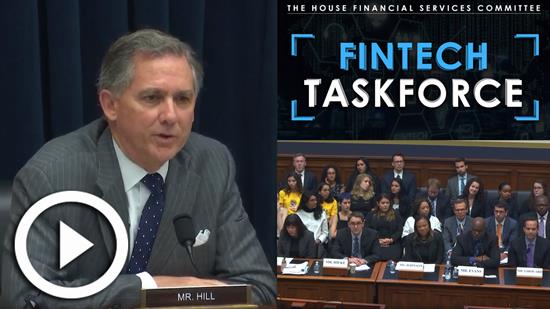Rep. Hill: "Alternative Data Can Connect More American Consumers with Affordable Credit"
Washington,
July 25, 2019
WASHINGTON, D.C. — Today, Ranking Member of the House Financial Services Committee Task Force on Financial Technology (FinTech), Congressman French Hill (AR-02), helped lead a hearing: "Examining the Use of Alternative Data in Underwriting and Credit Scoring to Expand Access to Credit."
Highlights of Congressman Hill's remarks as prepared are copied below. Analyzing the use of alternative data in the marketplace lending industry is an important sector within the broader FinTech ecosystem. I’m pleased that we were able to bring everyone together today to do a deeper dive on this topic. Marketplace or “FinTech” lenders, which are categorized through their digital or online focus, have recently emerged and grown over the last decade. According to S&P Global, marketplace lending grew by 30.1% in 2017. They provide unsecured credit to individuals and working capital to small businesses. They have unique funding models with financing provided by investors, credit facilities, securitizations or balance sheet cash. To help determine a borrower’s creditworthiness, marketplace lenders often use some form of alternative data. Traditional lenders typically have used FICO scores, three years of tax returns, and payment history for credit cards, mortgages and student loans to establish a risk profile for a borrower. However, marketplace lenders robustly combine FICO scores with alternative data points to better gauge their borrowers’ character and economic situation. Examples of these data points include education level, employment status, utility and rent payments, etc. Utilizing these data points has the potential to widen the universe of borrowers that can access affordable credit. A report by TransUnion outlined that lenders that utilized alternative data were able to lend to an additional 66% of borrowers in current markets and 56% in new markets. Today, we will explore concerns about how alternative data could violate fair lending requirements which will be discussed in more depth. However, I do want to remind my colleagues, that we don’t want overregulation to stifle innovation and prevent the American consumer from being able to access more affordable credit. As a former community bank executive, I understand well the compliance responsibilities around vendor/partner due diligence vendor “onboarding,” board of director review and approval. That being said, I understand the importance of banks maintaining a robust level of safety and soundness. With technology constantly changing, banks must ensure they are protecting their customers privacy against cybersecurity hacks and other threats. I look forward to hearing thoughts from the panel as to ways we can enhance this process. Over the past few years we’ve seen an increase in the amount of FinTechs partnering with incumbent financial institutions. I think this model will only continue to grow as FinTechs continue to innovate through leveraging different technologies, like the use of alternative data, we are discussing today. |



